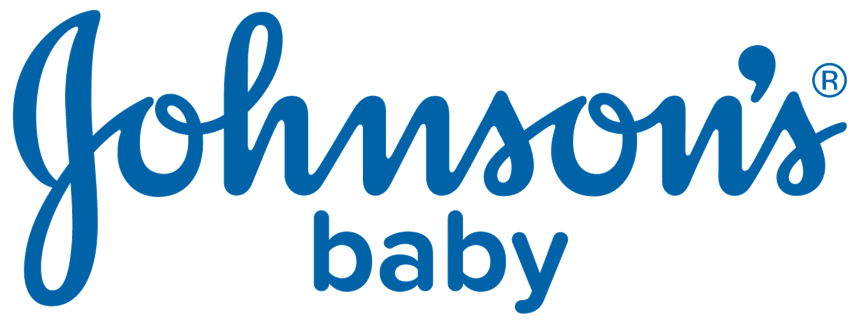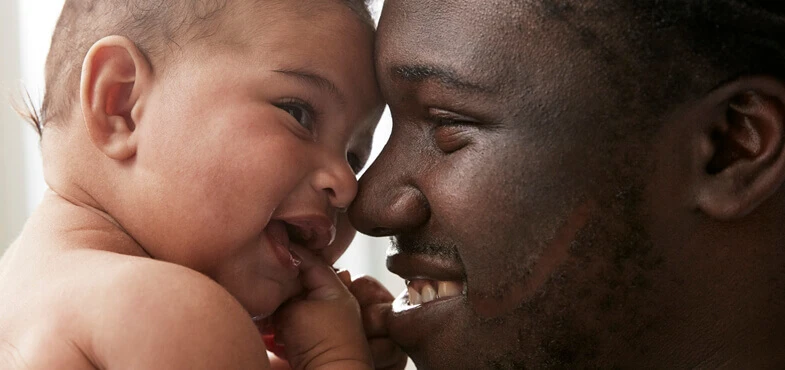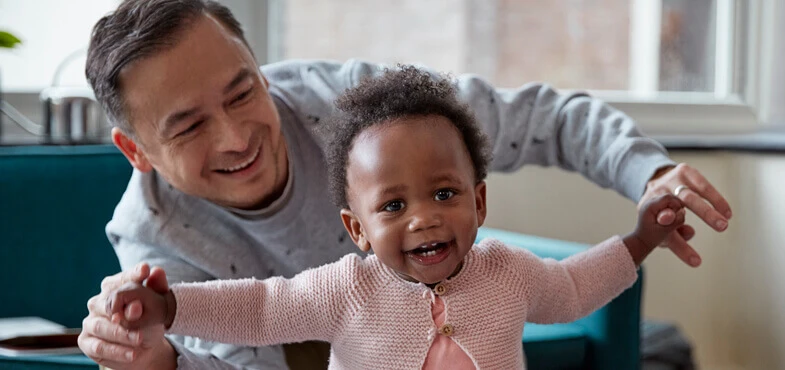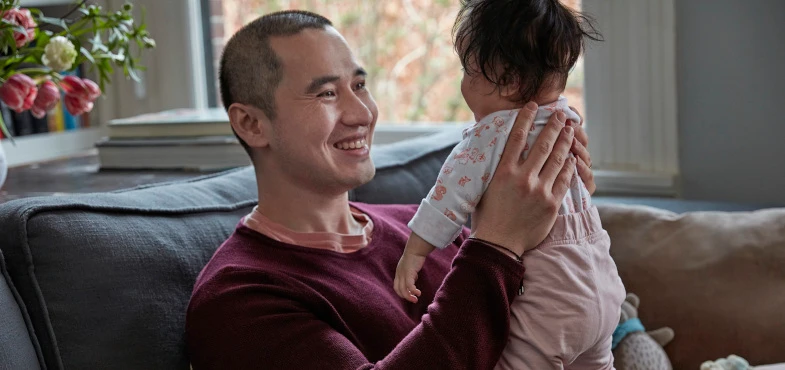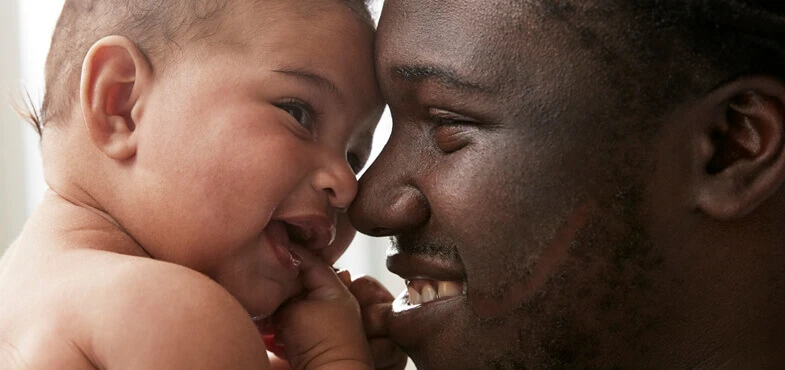Hearing your baby’s first words can be among the most enchanting moments shared between parent and child. Before then, your child has babbled, cried, screamed and cooed their way through their first few months, but their first word will often be the first sign that they’re growing into their own little person.
Wondering when your baby is going to talk and what they’re likely to say is a common query for parents. The truth is, every baby is different and there’s no right or wrong time for them to start talking.
Your child will follow their own unique path and eventually begin learning to talk at their own pace. You can help things along too by using several techniques to encourage them to form those early sounds and eventual full words.
Discover more about when babies start talking and the stages they go through before speaking their first words.
When do babies say their first word?
Any first words are usually an attempt at forming syllables and commonly occur around the six-month mark, though this differs from child to child.
A baby’s first word is a treasured memory for any parent and this once-in-a-lifetime event represents a development milestone. Your baby is taking their first steps on the journey to understanding language. At first, they may make noises that sound like babbling. This is an attempt at forming basic syllables and might soon sound like common first words like “mama” or “dada”.1
Though your little one won’t know what these words mean at this stage, nor directly associate them with you, this is the beginnings of pronouncing repetitive sounds. A common development timeline might look like this:2
0 – 5 months – Crying is going to be the main form of communication at this stage. As the weeks go by, your baby may begin to make simple sounds and gargles. “Oohs”, “aahs” and “coos” are common noises at this age.
4 – 6 months – Your baby may be able to babble as they reach half-a-year old. These noises are the first signs of your baby forming recognisable words and give a good indication of their speech development.
5 – 9 months – Listen carefully during these months as this is a common age for hearing those magical first words. Some babies will reach this stage earlier than others.
7 – 12 months – As their first birthday approaches, your little one may be able to start forming consonants and begin using simple intonations, like raising their voice at the end of a question.
When will my baby start talking?
Even though some babies start forming their first words around six months, it can still be a little while before they’ll be able to pronounce actual words you’d use in conversation. They’re also several months away from being capable of stringing words together to form sentences and chat with you.
Babies are fast learners and after they begin to talk, the language milestones can come thick and fast:
6 – 12 months – Babies start with syllables and can move swiftly on to consonants towards the 12 month mark, including some intonations and inflections in their voice.
10 – 15 months – Your baby will continue to progress and you’ll perhaps hear more consonants and letters as they babble away.
11 – 15 months – As they pass their first birthday, your little one will be able to string a few simple sounds together, explore a wider vocabulary and recognise basic phrases – though they may not always get them correct each time.
17 – 19 months – Now your baby will start to recognise, and copy sounds from their environment – maybe it’s the family dog barking or the noise of the doorbell?
20 – 24 months – As your baby approaches two, they’ll likely be little chatterboxes. They’ll begin to master the pronunciation of simple words and be able to say letters and phrases with more clarity.
24 months+ – Over the next year, your baby will be able to form sentences and hold basic conversations with you, a sure sign that their speech is developing nicely.
Do some babies develop quicker than others?
Yes, some babies will learn to talk earlier than others, however every child is unique. There are no defined ages or phrases they should be saying, just average development milestones - your little one will develop at their own pace.
Some children will be able to form simple words at seven months, while for others, this may not be until almost a year old. Generally, any time between six months and a year-and-a-half is a common age to start talking.
How do you help a baby learn to talk?
There are plenty of ways to help your baby along when they’re learning to talk. You can start within their first few weeks at home. Try:
Talking to your baby throughout the day
Explaining what you are doing to help with word association
Reading to them every day to increase the range of words they hear
These techniques can help to get your little one used to your voice and relating certain words with certain objects. Some techniques are better suited to different stages of your child’s development. Here are a few of the techniques you can try and when to introduce them to your baby:3
0 – 6 months – Chat to your baby throughout the day, explaining what you’re up to. You can sing to your child, make repetitive sounds and point out certain objects or people.
6 -12 months – Start reading to your baby, playing games and listening to music together. This will help your child explore more words and getting used to different types of language and communication.
12 – 18 months – Regularly reading and singing to your child can help them memorise words and phrases, even though they may not be able to understand or say them. It’s okay to correct your child too, if they are pronouncing words incorrectly.
18 – 24 months – Repeat words and phrases regularly to get your child used to them and identify objects and words. Use simple instructions and questions, and start introducing pronouns, like “you” and “your”.
24 months+ – Chat with your child throughout the day, getting them involved in cleaning, shopping and other daily tasks. Try and limit the amount of TV, games and digital exposure they’re getting at this age.
Your baby’s first words are a magical and memorable moment. Using the right techniques to help your little one along with their development can be a rewarding experience for parents too.
Discover more top tips and hints to help you through your baby’s first few months with JOHNSON’S® Baby.
1 https://www.webmd.com/parenting/baby-talk-your-babys-first-words#1
2 https://www.adam-mila.com/milestones/language-development/speaking/
JOHNSON'S®Pioneering Safety and Science in Baby Care
We are committed to working with Parents, Healthcare Professionals and Scientists to ensure our baby products continue to deliver high standards of safety and care.
